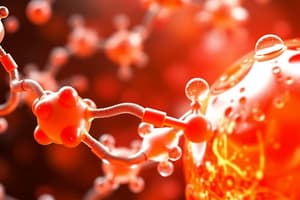Podcast
Questions and Answers
What role do enzymes play in metabolic pathways?
What role do enzymes play in metabolic pathways?
- They assemble small molecules into larger ones.
- They are the products formed at the end of pathways.
- They catalyze reactions to speed them up. (correct)
- They donate electrons in redox reactions.
What distinguishes biosynthetic pathways from degradative pathways?
What distinguishes biosynthetic pathways from degradative pathways?
- Biosynthetic pathways create high energy molecules, while degradative pathways produce lower energy products. (correct)
- Biosynthetic pathways are faster than degradative pathways.
- Biosynthetic pathways break down large molecules, while degradative pathways assemble small molecules.
- Biosynthetic pathways do not involve enzymes, while degradative pathways do.
In a redox reaction, what happens to the donor molecule?
In a redox reaction, what happens to the donor molecule?
- It transfers energy to the receptor molecule.
- It gains an electron and is reduced.
- It loses an electron and is oxidized. (correct)
- It remains unchanged during the reaction.
Which of the following accurately describes how electrons behave in electron transfer chains?
Which of the following accurately describes how electrons behave in electron transfer chains?
What are the end products of a metabolic pathway usually referred to as?
What are the end products of a metabolic pathway usually referred to as?
Flashcards
What are metabolic pathways?
What are metabolic pathways?
A series of chemical reactions that occur in a cell, starting with a specific reactant and ending with a final product.
What are reactants in a metabolic pathway?
What are reactants in a metabolic pathway?
Substances at the beginning of a metabolic pathway that are transformed into products.
What are products in a metabolic pathway?
What are products in a metabolic pathway?
Substances formed at the end of a metabolic pathway as a result of chemical reactions.
What are enzymes in a metabolic pathway?
What are enzymes in a metabolic pathway?
Signup and view all the flashcards
What are biosynthetic pathways?
What are biosynthetic pathways?
Signup and view all the flashcards
Study Notes
Metabolic Pathways
- Metabolism encompasses all biochemical reactions in a cell.
- Metabolic pathways follow a specific sequence: starting with a reactant, progressing through intermediate steps, and culminating in a final product.
- Reactants, also known as substrates, initiate the pathway.
- The end-product results from the pathway.
- Enzymes, primarily proteins, facilitate the reactions within the pathway.
Types of Metabolic Pathways
- Biosynthetic pathways build large, higher-energy molecules from smaller ones.
- Degradative pathways break down large molecules into smaller products with lower energy levels.
Redox Reactions
- Redox reactions involve electron transfers between molecules.
- An electron donor loses an electron and undergoes oxidation, while an electron acceptor gains an electron and undergoes reduction.
- Electron transfer chains involve a stepwise transfer of electrons, enabling a controlled release of energy.
- Electrons start at a high energy level and lose energy as they move through the chain, like descending a staircase.
Studying That Suits You
Use AI to generate personalized quizzes and flashcards to suit your learning preferences.




